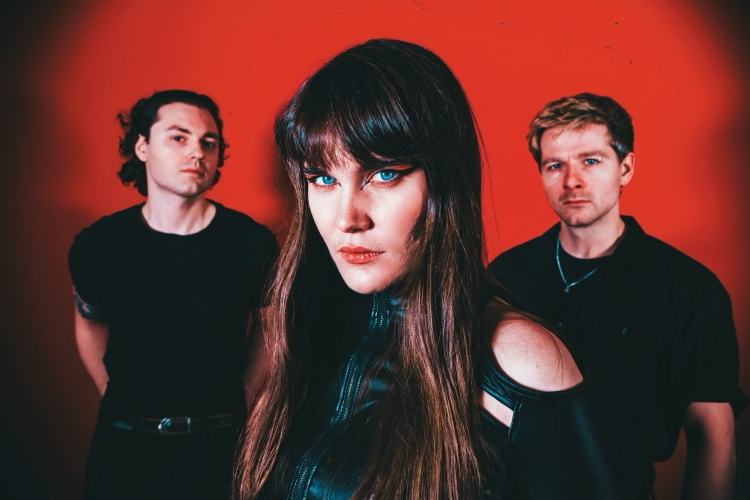Calva Louise found each other from opposite corners of the world, fusing backgrounds and visions into a singular sonic force. With roots stretching across continents, the trio channels the raw power of metal, the rebellion of punk, the textures of electronica, and the complexity of art rock into a sound that’s entirely their own. On their new studio album, Edge of the Abyss, released via Mascot Records, they push even further into a hidden world — one that’s intertwined with our own, yet brimming with fantastical tension and DIY energy. In an extensive interview, frontwoman Jess Allanic dives into the making of the album, its themes, and how the band’s DIY spirit continues to shape their evolving identity.
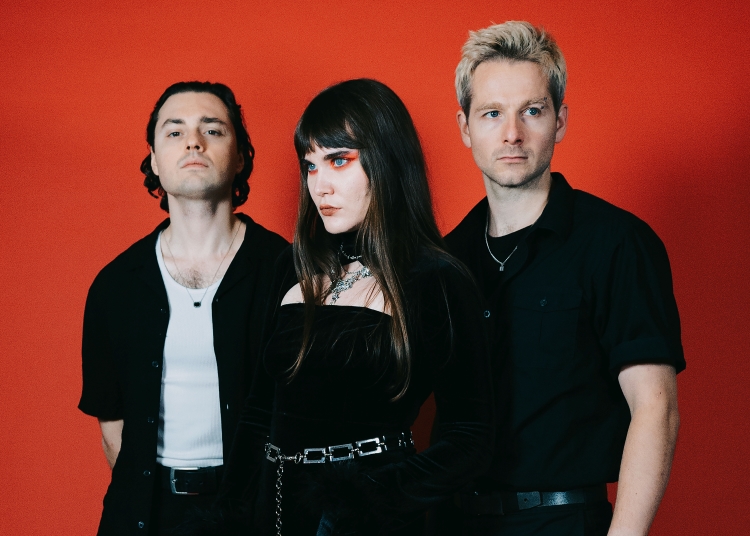
Welcome to Calva Louise
So, Jess. Welcome to Femme Metal Webzine. First of all, I want to thank you for taking the time to accept the interview. And I want to ask you, how are you, and how is this period treating you?
Thank you so much for having me. Yeah, I feel really good. And yeah, pretty, pretty happy about our album release.
Producing Calva Louise new album, part 1
You know, about “Edge of the Abyss“—I was listening to it a bit today and yesterday, and I found it amazing. I wanted to start by asking you about the production process. When did you begin putting all the songs together?
We started—well, I started writing these songs about two years ago, though there were ideas even before that. Some of the beats are over ten years old—just little ideas I came up with when I was around 17 or 18. So yeah, it began quite sporadically. We officially started recording maybe a year and a half ago, gradually, bit by bit.
It was a very DIY process. We recorded everything whenever we had time, and mostly where we live—not in a studio. I even wrote that on the album cover as a joke: “Recorded not in a studio.” But it’s true. We’d record anywhere—in the kitchen, wherever we could plug in the laptop and hook up the guitars through the interface.
Producing Calva Louise new album, part 2
The album came together slowly over time, but we finalized everything around last September. That’s when it was fully mixed and mastered. All the mixing and mastering was done remotely via Zoom with our friends who were helping us out. We’d often give feedback at 2 a.m., because everyone was in different parts of the world. We just worked whenever the opportunity came up.
Crossing paths with producer Garrett McGrillen
I know the album was co-produced with Garrett McGrillen. And despite the DIY ethos that Calva Louise has, I liked that you chose to co-produce it with them. How was the experience of working together, and what’s the most important lesson you learned from that collaboration?
That collaboration came about by chance. Garrett found out about us through social media. He’s such a kind person—he just sent us a message saying, “I love what you’re doing. It’d be great to meet if you’re ever in London.”
One day, we happened to be in London for a few hours, so we messaged him. He replied immediately like, “Yeah, come meet me—right now!” It wasn’t planned corporately or formally at all. Everything felt organic and personal.
Then, meeting Garrett McGrillen
We’re the kind of people who, when we see an opportunity, we go all in—without being pushy. For example, we were literally about to leave London, almost on the highway, when Garrett replied. He asked if we were still around, and we just turned the car around and went back to meet him.
From that point, he became a mentor to us in every way—especially with Amazon, our bassist. Garrett even lent him one of his pedalboards, saying, “I’m not using this one—you can have it.” It was surreal.
Garrett McGrillen as a mentor
Even when we were recording at home, he gave us incredible advice on how to make the most of our limited equipment. Sometimes Alison would call him up for guidance, saying, “Sorry to bother you, but could you help with this?” And Garrett would be like, “No problem at all.” He’d even say things like, “I’m about to go on stage, but I’ll call you right after.” So it truly felt like a mentorship. He’s the busiest person we know, yet somehow he was always available to support us. That meant the world to us.
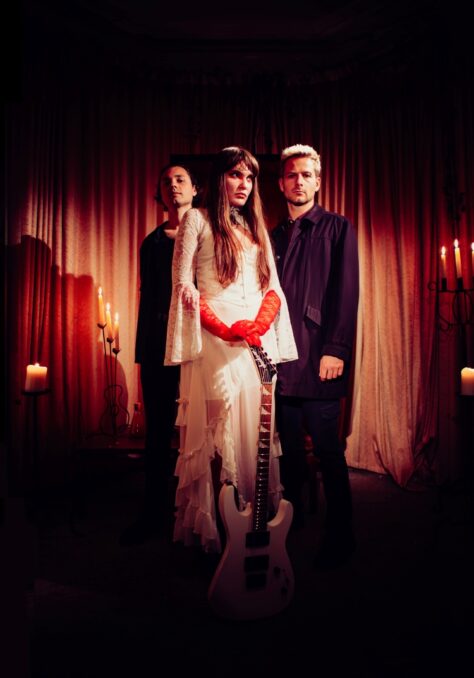
“We still feel like we won the lottery”.
It’s also strange—in a world that moves so fast—that at the same time, Calva Louise found someone so available and open to collaborate, despite being incredibly busy.
Yeah, exactly. And he’s constantly traveling, all over the world. We felt really lucky. I think Gareth even told us that he saw a bit of himself in us—in our friendship within the band, and in all our struggles. He said it’s important to understand and appreciate the struggle, to recognize what’s happening and be grateful for it.
I think he felt we were worth helping, and that meant a lot. It was really touching. Honestly, we still feel like we won the lottery.
Founding each other from opposite corners of the world
About always being on the move. I know you all found each other from opposite corners of the world: you’re originally from Venezuela, then there’s New Zealand, and Alison from France, eventually all coming together in the UK. I wanted to ask you about that—not the usual “What did you learn?” kind of question, because I know it can be boring—but more personally.
I know you moved twice and mentioned going through two cultural shocks. I relate to that—I moved from Italy to the Netherlands. So I wanted to ask how difficult it was for you in the beginning. Moving from Venezuela to France—did you feel alone, like most immigrants do when they first arrive somewhere new? I’m curious about what that beginning felt like, and what you took away from it.
From Venezuela to France
Yeah, I think I was very lucky in a way. The first move happened when I was 16, and because I was so young and full of energy, I had that kind of adventurous spirit and a bit of healthy naivety. You know, at that age, you’re a little more resilient to the emotional impact of big changes. Things that probably should have hit me harder kind of went over my head at the time. It’s only years later that I look back and think, “Ah, okay… now I get it. That hurt.”
The biggest shock of all: the cold
But back then, I just had so much stamina, so much drive. That helped me push through. The biggest shock at first, honestly, was the cold—I was so cold all the time. But beyond that, I started to realize I was basically at the bottom of everything—socially, culturally, even linguistically. I constantly felt like I had to catch up, like I was always one step behind. That feeling stayed with me for years. I lived on the edge of feeling overwhelmed, constantly adapting.
The small, subtle things are the hardest part
The hardest part wasn’t just the surface-level changes—it was the small, subtle things. The way people behave. The way they interact. Cultural differences that seem minor, but say a lot. I often felt like an alien trying to decode how people communicated, what they meant between the lines. Sometimes things that sounded negative were positive—and vice versa. It was confusing.
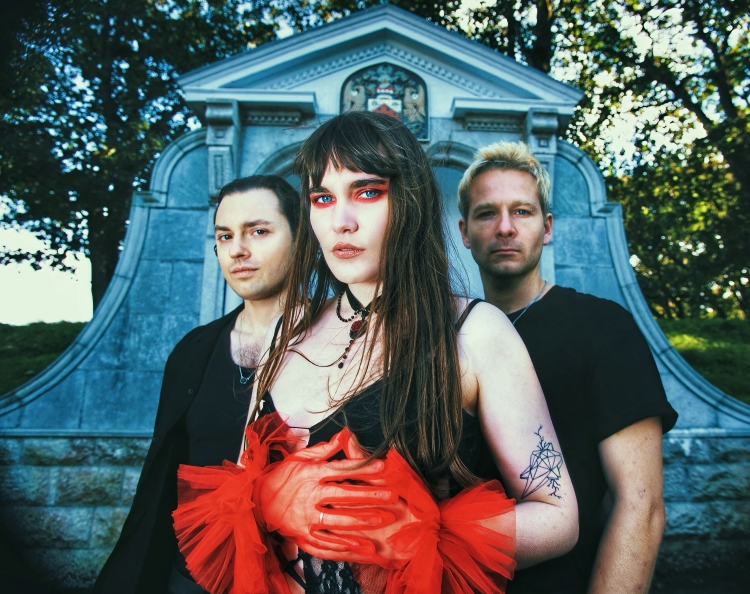
The biggest challenge of all
One of the biggest challenges was my accent. When I moved to France, I spoke French fluently, but people still said, “I don’t understand you.” That was frustrating. Eventually, I just said, “You know what? I’ll sing in Spanish.” And even then, sometimes people didn’t understand me in Spanish either! It was tough.
From France to England
The second move—from France to England—was easier in comparison. The culture shock going from Venezuela to France was way more intense. By the time I moved to England, I wanted to be there. I connected deeply with the music scene, the layout of venues, the energy of the bands—I felt like I belonged in that narrative.
Being in England
And I noticed that in England, even if people are being rude, they do it politely. That took me a while to figure out. Things didn’t fly over my head as much the second time—I was a bit more prepared. For Alison, though, it was harder. He didn’t speak English at all at first, so it took him more time to adjust. And switching between French and English can be its kind of challenge.
The name Calva Louise
I totally get what you mean. It’s like this constant battle over language. For example, in French, they say ordinateur for “computer,” but everywhere else in the world, including in Italian, we say “computer.” Those small differences make it clear how difficult it can be to truly get someone or a culture right. It’s those little things that make it hard to fit in sometimes, right?
Exactly. And that’s part of why we named the band Calva Louise—it’s a play on the idea of language and misunderstanding. It’s like, people speak the same language, but they don’t always understand each other because of the nuances, the different meanings behind words, or how people interact. There are so many little misunderstandings that happen, even within the same language. And it’s even harder when the cultures are different.
Understanding each other
But what we’ve found in our band, and what has brought us together, is true friendship. Even though we didn’t understand each other fully at the beginning, there was still an unspoken understanding between us. And that, in a way, is the beauty of it all.
Approaching the new album of Calva Louise, “Edge of the Abyss”, part 1
What I loved about the album is how it blends metal, Latin rock, electronic, and orchestral music. The first time I listened to “Edge of the Abyss”, I also noticed some elements that reminded me of Muse. I’m curious—how did you approach the musical texture of the album? I was surprised by how seamlessly you managed to bring together such different elements that, at times, might not traditionally go together. But in “Edge of the Abyss”, they work.
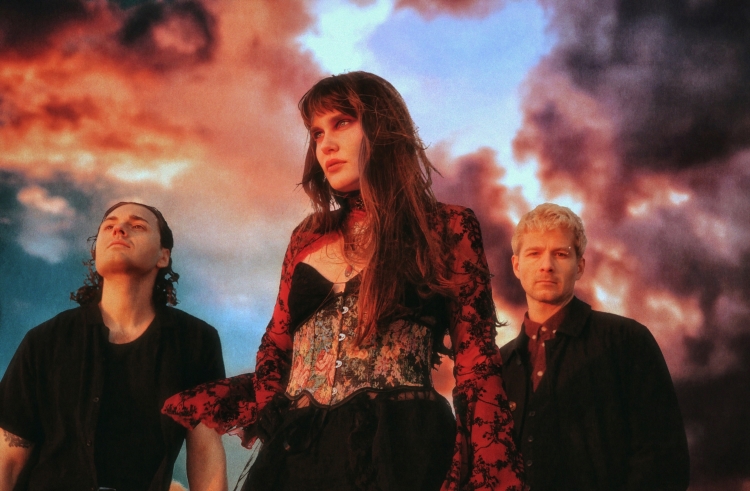
Approaching the new album of Calva Louise, “Edge of the Abyss”, part 2
Yeah, I think everything came together very organically. It was all spontaneous. It wasn’t a decision we consciously made—it just happened. It feels like a flow, almost like a stream of consciousness, where we let the subconscious take the lead rather than trying to make decisions with restrictions. We just went with what felt right.
“I just wanted to create from what I love.”
I think, personally, I was trying to organize my identity—not in a forced way, but in a natural way. I didn’t need to overthink it. I just wanted to create from what I love and where I come from. I started thinking about what makes me love where I grew up, what shaped me as a person.
Venezuelan influences
For example, coming from Venezuela and being influenced by music like gaita or cumbia, those cultural elements naturally found their way into our sound. The connection between gaita and metal or orchestral music might seem unusual to some, but to me, it makes total sense. It’s what I grew up listening to—things like the cuatro (a Venezuelan instrument), or playing piano. Those influences are a part of me that I can’t suppress—they’re something I need to celebrate.
“Everyone in the band felt the same way.”
It wasn’t just me—everyone in the band felt the same way. We all share similar tastes in music, and we’re always sharing new bands. It’s about celebrating what we love and not being afraid to include those elements in our music.
“Why should I restrict myself to fit in or to please people?”
I remember when I was 13 or 14, there were people who would criticize me for liking certain bands, especially when I moved to France. They’d say, “Oh, you like that band?” It felt so restricting, and for a while, I let it affect me. But writing this album was a way to break free from those limitations. I thought, “Why should I restrict myself to fit in or to please people? This is what I love, and that makes me who I am.”
Calva Louise is about embracing themselves musically
When we were writing, I thought about those people who tried to box me in, and I realized—if something is real and true, it will always be cool, no matter what others think. For us, it was all about embracing everything that shaped us and sharing that. For example, we got Ben maracas for his birthday, and then we’d watch videos together to learn how to play them properly.
Experimenting with Venezuelan sounds
My mom even sent us videos of people playing the cuatro with maracas in a very intricate, non-cliché way—just the way it’s done in Venezuela. And then we’d experiment with it—like I would play the cuatro with a pick, in a rock style. It’s all about respecting the tradition while also not being afraid to experiment. In the end, it’s our album. We get to decide what goes in it. We didn’t think about how people would react to it. We just focused on making something true to us.
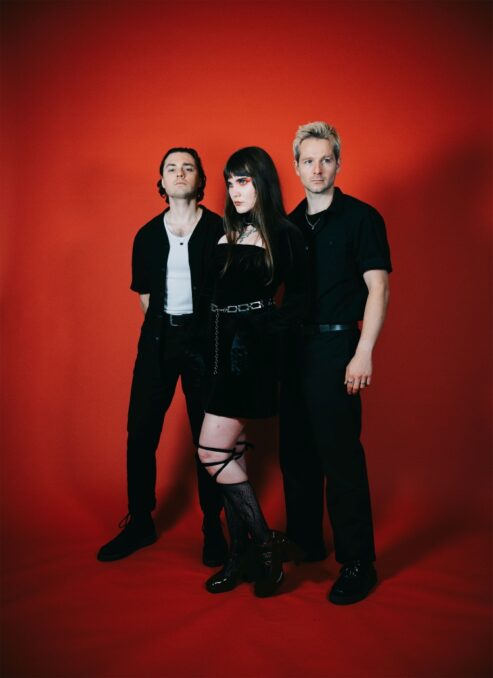
The backdrop story behind “WTF”, “La Corriente” & “Under the Skin”
I also really loved the videos, and I know that “WTF” is a prequel to a sci-fi story that continues with “La Corriente” and “Under the Skin”. I wanted to ask you about that sci-fi story—it’s something you created when you were a teenager, right? And I know it involves the search for doppelgängers. I’m curious to hear more about it.
Yeah, that’s right. In this album, we’re telling a bit of the story of the main characters and their quest to find their doppelgängers. The concept is that we live in a real world, but this world overlaps with many others. One of those is called the fractal world, which is where the doppelgängers exist. Essentially, they’re versions of ourselves, avatars that live through our experiences in the real world. The aim for the characters is to unite with their doubles, to become whole.
The main character, Louise
This story has been passed down through generations of people who’ve always sought to unify with their doubles. They believe that doing so will make them complete. In Edge of the Abyss, we follow Louise, the main character, as she first encounters her doppelgänger. These doubles appear in the real world, but they show up almost like hallucinations—kind of eerie and unsettling. But the fear they bring is a bit like life itself. You’re scared of something, but when you face it, it’s not as terrifying as you thought. So the doubles are also searching for people like us, the travelers—those of us living in the real world.
Finding the doppelgänger
WTF and Edge of the Abyss focus on a period in the ’90s, where a group of friends—like Louise, Johnny, and Vic—are guided by older, wiser characters like Julian and the Archivist, who already know much more about the connection between the worlds and why uniting with the doubles is so important. These characters are just beginning their journey, and they’re facing the first of many discoveries. They come face-to-face with danger and adventure, but it’s not just a scary journey for them. They have to step out of their comfort zones, make sacrifices, and take risks in order to follow their calling.
The metaphor behind the story
For us, this story is kind of a metaphor for being in a band. You have to sacrifice a lot and leave your comfort zone to follow something deep within you—a calling you can’t ignore. It’s like there’s no other option. If you don’t follow that path, you’ll just end up miserable. And that’s what these characters are searching for—union with their doppelgängers—because without it, they can’t be fulfilled in what they call “reality.”
The big challenge for Calva Louise
I also really love the main story behind the project because it feels like an everyday story, something relatable. I also watched the videos, and they’re great! I know they were made with a DIY spirit, which I think is nice. I understand you were in charge of producing, writing the story, and adding the special effects. How was that experience for you? Did you find it challenging?
The DIY spirit of Calva Louise
Yes, it was very challenging. But again, it was because we had no one else to do it for us. We didn’t have a budget, so we had to find the most cost-effective ways to get things done. When your budget is zero, you get creative. But it was great, because it allowed me to learn new skills and figure out how to translate ideas into reality. I enjoyed the process of finding solutions, even if it meant making mistakes along the way. It was all part of the fine-tuning process.
“The process of finding solutions”
I love and hate it both equally—the struggle, I mean. The satisfaction of getting through it, the lessons learned, and how it changes you as a person—that’s what I care about most. The results are only about 20% of what matters to me. If I could just press a button and have my idea come to life instantly, I wouldn’t want that. It needs that challenge and struggle to make it meaningful.
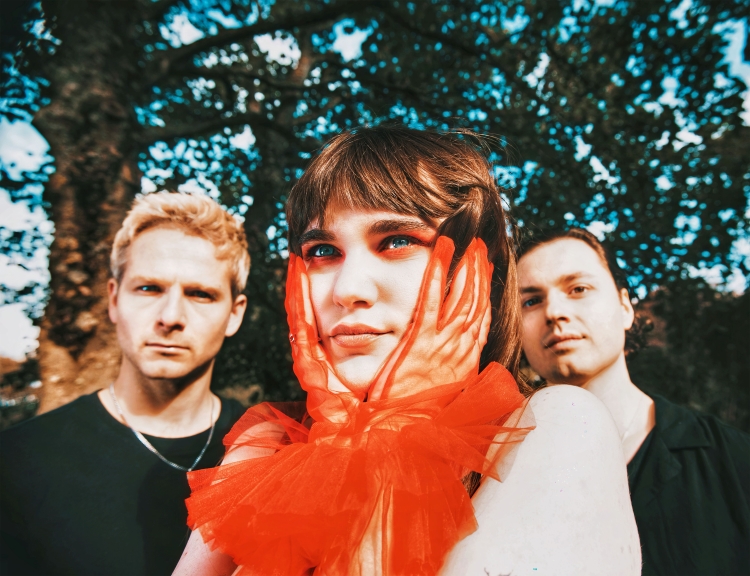
“While working on it, you appreciate it more.”
While working on it, you appreciate it more. You have time to reflect on what you’re trying to convey, and that’s something I value. But at the same time, it’s frustrating, too. There were many moments where I felt like crying because something wasn’t working, or I had to spend two days on something, only for it to fall apart. But those moments also help your brain come up with solutions—it’s like solving a puzzle.
Push yourself to the limit
So, you’re pushed to go beyond your limits and, in your own way, solve it. Maybe the first attempt isn’t great, but by the second or third, it starts to come together. Yeah.
Exactly, yeah. And I really enjoyed that. I enjoyed knowing that the effort means something—that there’s a purpose behind it. That’s also reflected in the story: the sense of purpose, the quest to find meaning in a world that sometimes tells you there is none. It would be easy to use AI for a video, but I don’t trust that. It could never understand what’s in my head.
The upcoming tour(s) of Calva Louise
So, Jess, I wanted to ask you about your upcoming tour in the U.S., starting in September. After that, you’ll head straight to Leipzig, Germany, right? So, you’ve got three months of touring ahead—it’s going to be crazy. I know you’ll be supporting Stray From the Path, yes? It might be a silly question, but what are you most looking forward to?
Oh, well, what I’m looking forward to the most is having the chance to relax a bit. Last tour was amazing, but I had to shoot the Aimless video at the same time, so it was a lot going on all at once. This time, I’m looking forward to focusing solely on one thing: playing live and enjoying the synergy with the audience.
“I love going on tour…”
I love going on tour because the more you play, the more it becomes like muscle memory. You reach a point where you don’t have to think about it so much—you can just decompress and fully enjoy the music. Touring helps with that, because you’re doing it every day. Each day, there’s less nervousness and more connection with the instrument and with the band. And I think the same goes for Alizon and Ben. Of course, there’s also the excitement of meeting new people and going to new places. It feels like a good working holiday.
Closing Words
So, Jess, I just want to thank you for your time and the interview. I appreciate it, and I hope you enjoyed it as much as I did. Thanks again!
Oh, thank you so much! Yeah, I had the best time chatting with you. I’d love to do it again soon.
